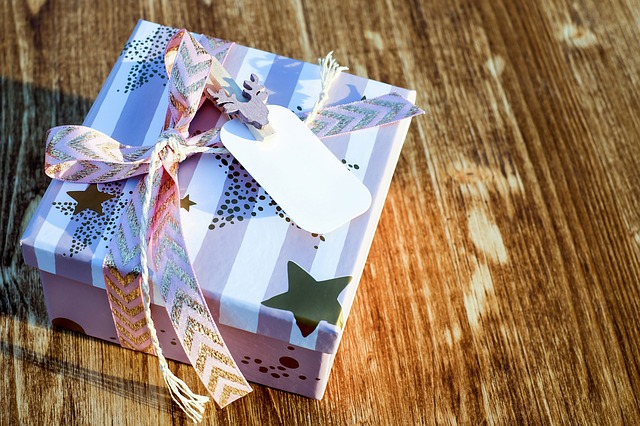
There are some words in the English language which find themselves manipulated into all sorts of forms, colloquialisms and variations, expanding that word until it explodes into a many-faceted prism which will shine in almost any conversation.
Take, for example, the word “give”.
Apart from the ridiculously extensive list of tenses - give, gives, giving, gave, given - and forms - gift (n), gifting (ger), give (v), gifted (adj) - this humble word is used widely by everyone of any age or gender and in almost any situation, whether serious (“Who will give this bride...?”), light-hearted (“Give us a kiss, Gramps.”), loving (“This gift is for you.”) cruel (“Give it to me or else.”), or plain old exasperated (“Give me a break, Peeves.”).
Clearly, the word “give” - and its many manifestations - is central to human interaction and understanding. Likewise, the concept of gifts/giving is also a significant human experience. Even when words are not possible, we all recognise the simple sign of offering a helping hand or the timeless gesture of handing someone a gift.
When giving loses its inner essence
But, as Loki discovered with the tesseract, even something noble and worthy can be used incorrectly or for the exact opposite purpose of “the good of all the realms”.
Suddenly, what was once a tool for the collaboration and interconnection of human kind becomes a weapon of dissention and greed; made even more dangerous because it is dressed as something that we instinctively know to be good.
Because giving and the art thereof is a good thing, right?
From the early age of I-only-speak-gibberish-but-I-still-want-exactly-what-I-want, our parents and mentors begin the exhausting and often discouraging process of training us to be something other than entitled little brats demanding Santa-flavoured lollipops for the rest of our lives.
Ma and Pa know that if we can just grasp the concept of mutual coexistence (Hint: I am not the only being on this planet), and if we can manage to do so with some sense of moral aptitude, kindness of character and a servant heart, then the world around us will be a much happier place. And we’ll be much happier too.
Yet even the art of giving, a simple act of human decency and love, can become twisted to serve our own individual wants and desires.
So where do we go wrong?
When giving becomes all about the giver
Giving a gift for the sake of the giver? Seems a bit oxymoronic. After all, I’m not the one gaining anything by handing over an item, or a piece of my time, or even a compliment. If I give someone something - be it object, input or praise - I am obviously doing so for their benefit.
Or am I?
If I honestly Post-It Note that question to every act of giving, how many times is the giving about the other, and how many times is it about me?
Did I give my sister that fancy salon voucher at my housewarming party because she tirelessly helped me move house? Or because I want to publicly make sure we’re even and I don’t come across as “indebted”?
Did I recommend my colleague for an upskilled role because I believe they will do it well and would love the chance? Or because further down the track I want to ride their rank up the ladder?
Did I compliment a friend on her dress to make her smile? Or to make her take note of my own stylish outfit? The point is not whether she returns the compliment – why did I give it in the first place?
When giving is not about the recipient
There is a simple litmus test which can take the guesswork out of my philanthropic daydreams and let me see straight up where my true intentions lie.
Interestingly, it hasn’t got much to do with the actual gift or the person I am about to bequeath with my magnanimous generosity. Rather, the person to watch is me - the giver - once the gift has been given.
Am I expecting them to trumpet their thanks to my social network group? Am I subtly reminding them that this shifts the debt to now be in my favour? Am I demanding that they worship my gift to prove they are truly my friend?
Receiving is an honour. Giving is a privilege. Our value does not hinge on either.
If my happiness and worth as a giver now depends solely on the receiver accepting it as I believe they should… well then it was never about the gift anyway.
It certainly wasn’t about the recipient upon whom I bestowed said gift.
When giving becomes nothing more, nothing less
Perhaps we have gotten a little too egotistical in our wielding of this wonderful word and its myriad of possibilities. Perhaps we have forgotten that giving is, in essence, simply another way in which we can experience personal and genuine connection and the relationships that flourish within that.
The art of giving selflessly is really not all that complicated.
Giver gives. Receiver receives. Human interaction blossoms.

Emma is an Italian-South African with a New Zealand passport, living in Papua New Guinea. As well as years of running a puppet ministry and directing student choirs, she has served with Mission Aviation Fellowship since 2007, currently based in PNG. Emma's deep joy is in writing, music, playing with her ginger cats and finding God in unexpected places.
Read Emma's creative expressions at http://www.girlkaleidoscope.wordpress.com or follow her PNG adventures at www.pngponderings.wordpress.com
Emma McGeorge’s previous articles may be viewed at www.pressserviceinternational.org/emma-mcgeorge.html

Emma is an Italian-South African with a New Zealand passport and an international heart. She spent years training student choirs and co-running a puppeteering business, before working for a humanitarian organisation in New Zealand (7 years) and Papua New Guinea (3 years). Currently a nomad living between various countries and towns, Emma's deep joy is in writing, music, cooking up an Italian storm, and taking time to listen to people’s stories.
Read Emma's creative expressions at http://www.girlkaleidoscope.wordpress.com or https://pngponderings.wordpress.com/2016/09/02/finding-the-beauty/
Emma’s previous articles may be viewed at www.pressserviceinternational.org/emma-mcgeorge.html